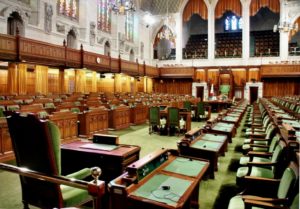A CUBAN, ERNESTO ALMEIDA, RUNS FOR A SEAT IN THE CANADIAN PARLIAMENT. PHOTOS.
Born in Havana and resident in Quebec since 2001, he is a candidate for the Conservative Party. Ernesto Almeida, the Cuban sheet metal worker who aspires to a seat in the Parliament of Canada.

Ernesto Almeida, candidate of the Conservative Party of Quebec in the Canadian town of L’Assomption. (Courtesy)
Cuban Ernesto Almeida arrived in Canada in 2001 to complete his training as a sheet metal worker and stayed in the country. Born in the neighborhood of Santa Felicia, in the Havana municipality of Marianao, he grew up “in a house where it rained more inside than outside, full of cockroaches and mice” and, today, he is the candidate of the Quebec Conservative Party in L’ Assomption, a town outside of Montreal.
The decision to migrate, he assures 14ymedio, was not among his plans at first. In Cuba, he worked for no less than the Ministry of the Interior, in Workshop Number 3 of the institution, and even won a science and technology award. “I was one of the best sheet metal workers,” he boasts.
After six years in that job, he left to work for himself, “on the street.” “He had many clients, including soldiers and doctors from the Cimeq [Center for Surgical Medical Research], and he had dollars and gasoline vouchers.”
Two years later, a former military boss of his who had been transferred to the Ministry of Construction told him about a Canadian who wanted to invest in auto repair shops and offered a training program. Almeida accepted. “Still a month later, being in Canada, I planned to return, but on the last night the two others who were with me on the mission deserted and I joined them.” During that time away from the island he had understood, he tells this newspaper, “the lie that the dictatorship tells about capitalism.” Thus, he requested political asylum and did not return.
On the Island, Almeida never had any problems because of his ideas. “Because I didn’t trust anyone, I didn’t talk about this, not even my family,” he says. “Also, my grandmother had a great reputation as a communist.” One day, before she died, seeing that his grandson was making a good living working as a body shop, the woman confessed to him: “I lost everything because of the Revolution; in the end, look at the conditions I live in.”
THEIR POLITICAL ASPIRATIONS BEGIN…
Graduated in automotive body manufacturing, in Canada he worked in the same sector, at Carrosserie Multi Marques, since 2007.
The politician says that his political concerns began in Canada with his affiliation to the organization Cuba Independiente y Democrática (CID), the anti-Castro organization founded in exile by Huber Matos, which in Quebec is in charge of raising funds to help Cubans who arrive and send humanitarian aid to the island.
Later, he joined the Conservative Party of Pierre Poilievre, as opposed to the Liberal Party of the current Canadian Prime Minister, Justin Trudeau, “for being a defender of democracy, against the manipulation of the media” by the current government.
In addition, he recalls, Poilievre, married to the Venezuelan Anaida Galindo, “is against communism” and “understands the suffering of countries led by dictatorships.”
Almeida supports two internationally controversial causes. One, the so-called “freedom convoy”, the protests of truckers against the restrictions imposed in Canada to stop the spread of covid-19 and the obligation to get vaccinated. On the other hand, he is a great admirer of the president of El Salvador, Nayib Bukele.
Regarding the first, he explains that he is not against vaccines in general, but against covid. “I think that the trial time is insufficient to see the side effects,” he says, and refers that “more deadly diseases have existed for a long time and there has never been a confinement, health pass or things like that”, measures that he judges “hypocrisy.” ” (“some of the places that could be open and others not”).
As vice president of CID, he feels committed to “contributing to the democratic reconstruction of Cuba, for a change that is as peaceful as possible.”
As for Bukele’s “iron fist” policy against Salvadoran gangs, criticized by international organizations such as Amnesty International, he defends that “an honest government must be concerned first and foremost with the safety of families and honest workers because that is the future development of a country”.
With his candidacy, Almeida says, he also intends to “show Cubans that a simple sheet metal worker can reach a high political level through his determination.” The politician promises that if he enters the Canadian Parliament, he will be “active in the negotiations” towards Cuba to stop, “within my possibilities, the oxygen to the dictatorship.”
At the same time, as vice president of the CID, he feels committed to “contributing to the democratic reconstruction of Cuba, for a change that is as peaceful as possible, although I know that on the part of the PCC, they prefer dictatorship or death.”
As a migrant for more than twenty years, he sees the current unstoppable exodus from the island as “a plan by the Cuban government to pressure democratic countries to ask for monetary aid and not pay, as they did with the millions earmarked for thermoelectric plants and They used it for something else.” Similarly, he believes that “agents who work for the dictatorship” are also included in the migration.
Like many other Cubans residing outside the Island, he sees the protests of July 11, 2021, as “a before and after”: “That date is the beginning of the end of the dictatorship, the true moment that marked the loss of fear among Cubans”.
Almeida would like to return one day to his native country, but “to a free and democratic Cuba, like the one Celia Cruz dreamed of.” Perhaps, he reflects, “the fact that politics has interested me is the beginning of an apprenticeship for, in the not too distant future, accompanying change in Cuba.”
UN CUBANO, ERNESTO ALMEIDA, ASPIRA A UN ESCANO EN EL PARLAMENTO CANADIENSE. PHOTOS.
Nacido en La Habana y residente en Quebec desde 2001, es candidato por el Partido Conservador. Ernesto Almeida, el chapista cubano que aspira a un escaño en el Parlamento de Canadá

Ernesto Almeida, candidato del Partido Conservador de Quebec en la localidad canadiense de L’Assomption. (Cortesía)
El cubano Ernesto Almeida llegó en el año 2001 a Canadá para completar su formación como chapista y se quedó en el país. Nacido en el barrio de Santa Felicia, en el municipio habanero de Marianao, creció “en una casa en la que llovía más dentro que afuera, llena de cucarachas y ratones” y, hoy, es el candidato del Partido Conservador de Quebec en L’Assomption, una localidad a las afueras de Montreal.
La decisión de migrar, asegura a 14ymedio, no estaba entre sus planes en un principio. En Cuba, trabajaba nada menos que para el Ministerio de Interior, en el Taller Número 3 de la institución y ganó incluso un premio de ciencia y tecnología. “Yo era uno de los mejores chapistas”, presume.
Tras seis años en ese empleo, salió para trabajar por su cuenta, “en la calle”. “Tenía muchos clientes, entre ellos militares y doctores del Cimeq [Centro de Investigaciones Médico Quirúrgicas], y disponía de dólares y bonos de gasolina”.
Dos años después, un militar, antiguo jefe suyo, al que habían transferido al Ministerio de la Construcción, le habló de un canadiense que quería invertir en talleres de reparación para automóviles y ofrecía un programa de capacitación. Almeida aceptó. “Todavía un mes más tarde, estando en Canadá, yo pensaba volver, pero en la última noche los dos otros que estaban conmigo en la misión desertaron y yo me sumé a ellos”. En ese tiempo fuera de la Isla había comprendido, dice a este diario, “la mentira que cuenta la dictadura sobre el capitalismo”. Así, pidió asilo político y ya no regresó.
En la Isla, Almeida nunca tuvo problemas por sus ideas. “Como no confiaba en nadie, no hablaba de esto, ni en mi familia”, relata. “Además, mi abuela tenía una gran reputación como comunista”. Un día, antes de morir, al ver que su nieto se ganaba bien la vida con trabajos de chapistería, la mujer le confesó: “Yo perdí todo por la Revolución; al final, mira en las condiciones que vivo”.
COMIENZAN SUS ASPIRACIONES POLITICAS…
Graduado en fabricación de carrocerías automotrices, en Canadá trabajó en ese mismo sector, en la empresa Carrosserie Multi Marques, desde 2007.
El político refiere que sus inquietudes políticas iniciaron en Canadá con su adscripción a la organización Cuba Independiente y Democrática (CID), la organización anticastrista fundada en el exilio por Huber Matos que en Quebec se encarga de recaudar fondos para ayudar a los cubanos que llegan y enviar ayuda humanitaria a la Isla.
Después, se afilió al Partido Conservador de Pierre Poilievre, opositor al Partido Libertal del actual primer ministro canadiense, Justin Trudeau, “por ser un defensor de la democracia, en contra de la manipulación de medios informativos” por parte del actual Gobierno.
Además, recuerda, Poilievre, casado con la venezolana Anaida Galindo, “está en contra del comunismo” y “comprende el sufrimiento de los países dirigidos por dictaduras”.
Almeida apoya dos causas polémicas internacionalmente. Una, el llamado “convoy de la libertad”, las protestas de camioneros contra las restricciones impuestas en Canadá para detener los contagios de covid-19 y la obligación de vacunarse. Por otra parte, es un gran admirador del presidente de El Salvador, Nayib Bukele.
Al respecto de lo primero, explica que no está en contra de las vacunas en general, pero sí las del covid. “Creo que el tiempo de prueba es insuficiente para ver los efectos secundarios”, dice, y refiere que “desde hace mucho tiempo existen enfermedades más mortales y nunca ha habido un confinamiento, pase sanitario o cosas así”, medidas que juzga “una hipocresía” (“algunos de los lugares que podían estar abiertos y otros no”).
Como vicepresidente de CID, se siente comprometido a “contribuir a la reconstrucción democrática de Cuba, para un cambio lo más pacífico posible”
En cuanto a la política de “mano dura” de Bukele contra las pandillas salvadoreñas, criticadas por organizaciones internacionales como Amnistía Internacional, defiende que “un Gobierno íntegro debe preocuparse en primer plano de la seguridad de las familias y los trabajadores honrados, porque ese el futuro del desarrollo de un país”.
Con su candidatura, refiere Almeida, pretende también “demostrarles a los cubanos que un simple chapista puede llegar a un alto nivel político por su determinación”. El político promete que si entra al Parlamento canadiense, será “activo en las negociaciones” hacia Cuba para frenar, “dentro de mis posibilidades, el oxígeno a la dictadura”.
A la vez, como vicepresidente de CID, se siente comprometido a “contribuir a la reconstrucción democrática de Cuba, para un cambio lo más pacífico posible, aunque sé que por parte del PCC, prefieren dictadura o muerte”.
Como migrante desde hace más de veinte años, observa el actual éxodo imparable de la Isla como “un plan del Gobierno cubano para presionar a los países democráticos para pedir ayudas monetarias y no pagar, como hicieron con los millones destinados a las termoeléctricas y que se utilizaron en otra cosa”. De igual manera, opina que dentro de la migración también van “agentes que trabajan para la dictadura”.
Al igual que muchos otros cubanos residentes fuera de la Isla, concibe las protestas del 11 de julio de 2021, como “un antes y un después”: “Esa fecha es el inicio del final de la dictadura, el verdadero momento que marcó la pérdida del miedo entre los cubanos”.
Almeida quisiera volver un día a su país natal, pero “a una Cuba libre y democrática, como la que soñó Celia Cruz”. Quizá, reflexiona, “el hecho que me haya interesado la política es el inicio de un aprendizaje para, un futuro no muy lejano, acompañar el cambio en Cuba”.
Agencies/ 14yMedio, La Habana/ Yaiza Santos/ Extractos/ Excerpts/ Internet Photos/ Arnoldo Varona/ www.TheCubanHistory.com
THE CUBAN HISTORY, HOLLYWOOD.



 A CUBAN, Ernesto Almeida, runs for a Seat in the Canadian Parliament. PHOTOS. * UN CUBANO, Ernesto Almeida, aspira a un Escaño en el Parlamento Canadiense. PHOTOS.
A CUBAN, Ernesto Almeida, runs for a Seat in the Canadian Parliament. PHOTOS. * UN CUBANO, Ernesto Almeida, aspira a un Escaño en el Parlamento Canadiense. PHOTOS.




